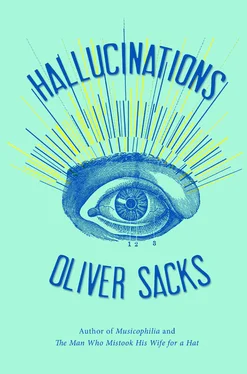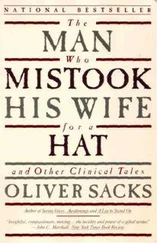During the week, I would avoid drugs, working as a resident at UCLA’s neurology department. I was amazed and moved, as I had been as a medical student in London, by the range of patients’ neurological experiences, and I found that I could not comprehend these sufficiently, or come to terms with them emotionally, unless I attempted to describe or transcribe them. It was then that I wrote my first published papers and my first book (it was never published, because I lost the manuscript).
But on the weekends, I often experimented with drugs. I recall vividly one episode in which a magical color appeared to me. I had been taught, as a child, that there were seven colors in the spectrum, including indigo (Newton had chosen these, somewhat arbitrarily, by analogy with the seven notes of the musical scale). But some cultures recognize only five or six spectral colors, and few people agree as to what indigo is like.
I had long wanted to see “true” indigo, and thought that drugs might be the way to do this. So one sunny Saturday in 1964, I developed a pharmacologic launchpad consisting of a base of amphetamine (for general arousal), LSD (for hallucinogenic intensity), and a touch of cannabis (for a little added delirium). About twenty minutes after taking this, I faced a white wall and exclaimed, “I want to see indigo now — now!”
And then, as if thrown by a giant paintbrush, there appeared a huge, trembling, pear-shaped blob of the purest indigo. Luminous, numinous, it filled me with rapture: It was the color of heaven, the color, I thought, which Giotto had spent a lifetime trying to get but never achieved — never achieved, perhaps, because the color of heaven is not to be seen on earth. But it had existed once, I thought — it was the color of the Paleozoic sea, the color the ocean used to be. I leaned toward it in a sort of ecstasy. And then it suddenly disappeared, leaving me with an overwhelming sense of loss and sadness that it had been snatched away. But I consoled myself: Yes, indigo exists , and it can be conjured up in the brain.
For months afterward, I searched for indigo. I turned over little stones and rocks near my house, looking for it. I examined specimens of azurite in the natural history museum — but even they were infinitely far from the color I had seen. And then, in 1965, when I had moved to New York, I went to a concert in the Egyptology gallery of the Metropolitan Museum of Art. In the first half, a Monteverdi piece was performed, and I was utterly transported. I had taken no drugs, but I felt a glorious river of music, four hundred years long, flowing from Monteverdi’s mind into my own. In this ecstatic mood, I wandered out during the intermission and looked at the ancient Egyptian objects on display — lapis lazuli amulets, jewelry, and so forth — and I was enchanted to see glints of indigo. I thought: Thank God, it really exists!
During the second half of the concert, I got a bit bored and restless, but I consoled myself, knowing that I could go out and take a “sip” of indigo afterward. It would be there, waiting for me. But when I went out to look at the gallery after the concert was finished, I could see only blue and purple and mauve and puce — no indigo. That was nearly fifty years ago, and I have never seen indigo again.
When a friend and colleague of my parents’ — Augusta Bonnard, a psychoanalyst — came to Los Angeles for a year’s sabbatical in 1964, it was natural that we should meet. I invited her to my little house in Topanga Canyon, and we had a genial dinner together. Over coffee and cigarettes (Augusta was a chain-smoker; I wondered if she smoked even during analytic sessions), her tone changed, and she said, in her gruff, smoke-thickened voice, “You need help, Oliver. You’re in trouble.”
“Nonsense,” I replied. “I enjoy life. I have no complaints; all is well in work and love.” Augusta let out a skeptical grunt, but she did not push the matter further.
I had started taking LSD at this point, and if that was not available, I would take morning glory seeds instead (this was before morning glory seeds were treated with pesticides, as they are now, to prevent drug abuse). Sunday mornings were usually my drug time, and it must have been two or three months after meeting Augusta that I took a hefty dose of Heavenly Blue morning glory seeds. The seeds were jet black and of agate-like hardness, so I pulverized them with a pestle and mortar and then mixed them with vanilla ice cream. About twenty minutes after eating this, I felt intense nausea, but when it subsided, I found myself in a realm of paradisiacal stillness and beauty, a realm outside time, which was rudely broken into by a taxi grinding and backfiring its way up the steep trail to my house. An elderly woman got out of the taxi, and, galvanized into action, I ran towards her, shouting, “I know who you are — you are a replica of Augusta Bonnard. You look like her, you have her posture and movements, but you are not her. I am not deceived for a moment.” Augusta raised her hands to her temples and said, “Oy! This is worse than I realized.” She got back into the taxi, and took off without another word.
We had plenty to talk about the next time we met. My failure to recognize her, my seeing her as a “replica,” she thought, was a complex form of defense, a dissociation which could only be called psychotic. I disagreed and maintained that my seeing her as a duplicate or impostor was neurological in origin, a disconnection between perception and feelings. The ability to identify (which was intact) had not been accompanied by the appropriate feeling of warmth and familiarity, and it was this contradiction which had led to the logical though absurd conclusion that she was a “duplicate.” (This syndrome, which can occur in schizophrenia, but also with dementia or delirium, is known as Capgras syndrome.) Augusta said that whichever view was correct, taking mind-altering drugs every weekend, alone, and in high doses, surely testified to some intense inner needs or conflicts, and that I should explore these with a therapist. (In retrospect, I am sure she was right, and I began seeing an analyst a year later.)
The summer of 1965 was a sort of in-between time: I had completed my residency at UCLA and had left California, but I had three months ahead of me before taking up a research fellowship in New York. This should have been a time of delicious freedom, a wonderful and needed holiday after the sixty- and sometimes eighty-hour workweeks I had had at UCLA. But I did not feel free; I get unmoored, have a sense of emptiness and structurelessness, when I am not working — it was weekends which were the danger times, the drug times, when I lived in California — and now an entire summer in my hometown, London, stretched before me like a three-month-long weekend.
It was during this idle, mischievous time that I descended deeper into drug taking, no longer confining it to weekends. I tried intravenous injection, which I had never done before. My parents, both physicians, were away, and, having the house to myself, I decided to explore the drug cabinet in their surgery on the ground floor for something special to celebrate my thirty-second birthday. I had never taken morphine or any opiates before. I used a large syringe — why bother with piddling doses? And after settling myself comfortably in bed, I drew up the contents of several vials, plunged the needle into a vein, and injected the morphine very slowly.
Within a minute or so, my attention was drawn to a sort of commotion on the sleeve of my dressing gown, which hung on the door. I gazed intently at this, and as I did so, it resolved itself into a miniature but microscopically detailed battle scene. I could see silken tents of different colors, the largest of which was flying a royal pennant. There were gaily caparisoned horses, soldiers on horseback, their armor glinting in the sun, and men with longbows. I saw pipers with long silver pipes, raising these to their mouths, and then, very faintly, I heard their piping, too. I saw hundreds, thousands of men — two armies, two nations — preparing to do battle. I lost all sense of this being a spot on the sleeve of my dressing gown, of the fact that I was lying in bed, that I was in London, that it was 1965. Before shooting up the morphine, I had been reading Froissart’s Chronicles and Henry V , and now these became conflated in my hallucination. I realized that what I was gazing at from my aerial viewpoint was Agincourt, late in 1415, that I was looking down on the serried armies of England and France drawn up to do battle. And in the great pennanted tent, I knew, was Henry V himself. I had no sense that I was imagining or hallucinating any of this; what I saw was actual, real.
Читать дальше












